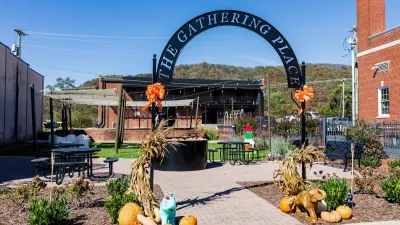The Boston Foundation's first Place Leadership Network process offers lessons in how to build place-based coalitions to advance the cause of equity.

The Boston Foundation is responding to the unequal economic, environmental, and cultural impacts of development in Boston by spearheading a new investments in "place governance," rather than the typical approach of placemaking interventions, through its Place Leadership Network program.
Philip Barash, a design fellow with the Boston Foundation, explains the Place Leadership Network program in a guest blog post for the Brookings Institution. The Foundation launched the Place Leadership Network in May 2019, announcing an application process to participate in the peer-learning initiative that eventually yielded eight teams.
"Participants would be compensated for their yearlong commitment and be eligible for unrestricted funding at the end of the year to support community-led placemaking and place-keeping agendas," explains Barash. Many of the selected teams represent organizations serving communities of color, are led by people of color, and work with small budgets. An article by Sandra Larson for Next City in July 2019 detailed the first cohort of the PLN program.
Barash includes a lot of detail about the curriculum of the nine-month PLN process, including how the curriculum changed as a result of the pandemic. The results were powerful, according to Barash, and point the direction for future efforts: "PLN demonstrated that community leaders can fully, confidently, and justly shape the futures of their shared places. Through the months, we kept hearing a similar refrain from the cohort: If Boston has any hope of altering development dynamics to center community interest and spatial justice, we need to continue shifting the power balance."
FULL STORY: How an equitable place governance pilot in Boston is shifting power balances

Alabama: Trump Terminates Settlements for Black Communities Harmed By Raw Sewage
Trump deemed the landmark civil rights agreement “illegal DEI and environmental justice policy.”

Planetizen Federal Action Tracker
A weekly monitor of how Trump’s orders and actions are impacting planners and planning in America.

The 120 Year Old Tiny Home Villages That Sheltered San Francisco’s Earthquake Refugees
More than a century ago, San Francisco mobilized to house thousands of residents displaced by the 1906 earthquake. Could their strategy offer a model for the present?

LA’s Tree Emergency Goes Beyond Vandalism
After a vandal destroyed dozens of downtown LA trees, Mayor Karen Bass vowed to replace them. Days later, she slashed the city’s tree budget.

Sacramento Leads Nation With Bus-Mounted Bike Lane Enforcement Cameras
The city is the first to use its bus-mounted traffic enforcement system to cite drivers who park or drive in bike lanes.

Seattle Voters Approve Social Housing Referendum
Voters approved a corporate tax to fund the city’s housing authority despite an opposition campaign funded by Amazon and Microsoft.
Urban Design for Planners 1: Software Tools
This six-course series explores essential urban design concepts using open source software and equips planners with the tools they need to participate fully in the urban design process.
Planning for Universal Design
Learn the tools for implementing Universal Design in planning regulations.
Ada County Highway District
Clanton & Associates, Inc.
Jessamine County Fiscal Court
Institute for Housing and Urban Development Studies (IHS)
City of Grandview
Harvard GSD Executive Education
Toledo-Lucas County Plan Commissions
Salt Lake City
NYU Wagner Graduate School of Public Service





























